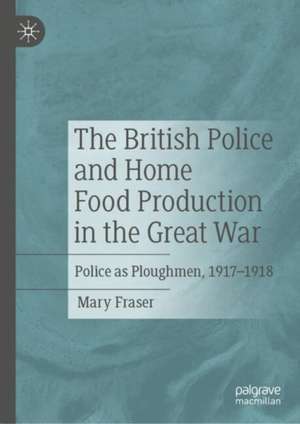The British Police and Home Food Production in the Great War: Police as Ploughmen, 1917–1918
Autor Mary Fraseren Limba Engleză Hardback – 26 iun 2024
Preț: 745.78 lei
Preț vechi: 819.55 lei
-9% Nou
Puncte Express: 1119
Preț estimativ în valută:
142.71€ • 152.60$ • 118.98£
142.71€ • 152.60$ • 118.98£
Carte tipărită la comandă
Livrare economică 14-19 aprilie
Preluare comenzi: 021 569.72.76
Specificații
ISBN-13: 9783031587429
ISBN-10: 3031587421
Pagini: 250
Ilustrații: XVII, 222 p. 7 illus., 4 illus. in color.
Dimensiuni: 148 x 210 mm
Ediția:2024
Editura: Springer Nature Switzerland
Colecția Palgrave Macmillan
Locul publicării:Cham, Switzerland
ISBN-10: 3031587421
Pagini: 250
Ilustrații: XVII, 222 p. 7 illus., 4 illus. in color.
Dimensiuni: 148 x 210 mm
Ediția:2024
Editura: Springer Nature Switzerland
Colecția Palgrave Macmillan
Locul publicării:Cham, Switzerland
Cuprins
Chapter 1: Introduction.- Chapter 2: The Developing Food Crisis in World War One.- Chapter 3: Help for Farmers; No Stone Left Unturned.- Chapter 4: Horse and Mechanical Help for Farmers.- Chapter 5: The Importance of Increased Crop Production to Feed the Nation.- Chapter 6: Policemen in England Helped Farmers from March 1917 to the End of the War.- Chapter 7: Policemen in Scotland Helped Farmers from March 1917 to the End of the War.- Chapter 8: Release of Policemen in Birmingham and Glasgow: Two Case Studies.- Chapter 9: The Outcome for Britain of the Food Shortages of 1917.
Notă biografică
Mary Fraser is a social researcher based at the Scottish Centre for Crime & Justice Research, University of Glasgow, UK. She gained a PhD from Goldsmiths, University of London in 1995 and has been researching the history of the work of the British police for around 20 years. This is her second book on police history; the first, Policing the Home Front 1914-1918: The Control of the British Population at War, was published in 2019. She was awarded a Fellowship of the Royal Historical Society in 2023.
Textul de pe ultima copertă
This book explores the role of the British Police in home food production during the First World War, a critical time when decreasing food imports threatened population starvation around the country. Drawing from the police’s most popular weekly journal, the book provides insights into policemen’s lives, the political context in which they worked, and the pressures on police forces throughout Britain during the Great War. Unlike neighbouring countries in Europe, Britain avoided major food riots due to government control of farming from December 1916, which prioritised agriculture to feed the nation. The police force released over 400 policemen in England and Scotland to serve as ploughmen from March 1917 for around two months. Almost a third of policemen throughout Britain had previous agricultural backgrounds and so were welcomed by farmers as experienced workers. This book illustrates not only why the food crisis arose and the state of British farming during the war, but it also sheds light on how individual police forces were approached and encouraged to release their policemen, at a time when police forces themselves were critically short of staff due to recruitment into the war. The author discusses how the release of policemen into agriculture as first responders benefitted the police and provided surveillance over home food production in the national interest.
Mary Fraser is a social researcher based at the Scottish Centre for Crime & Justice Research, University of Glasgow, UK. She gained a PhD from Goldsmiths, University of London in 1995 and has been researching the history of the work of the British police for around 20 years. This is her second book on police history; the first, Policing the Home Front 1914-1918: The Control of the British Population at War, was published in 2019. She was awarded a Fellowship of the Royal Historical Society in 2023.
Mary Fraser is a social researcher based at the Scottish Centre for Crime & Justice Research, University of Glasgow, UK. She gained a PhD from Goldsmiths, University of London in 1995 and has been researching the history of the work of the British police for around 20 years. This is her second book on police history; the first, Policing the Home Front 1914-1918: The Control of the British Population at War, was published in 2019. She was awarded a Fellowship of the Royal Historical Society in 2023.
Caracteristici
Examines how the British Police contributed to agriculture and home food production during the First World War Draws from the police's most popular weekly journal, shedding light on British policeman's lives and work Highlights the role of policemen as first responders during the Great War, but also more recently during the pandemic
